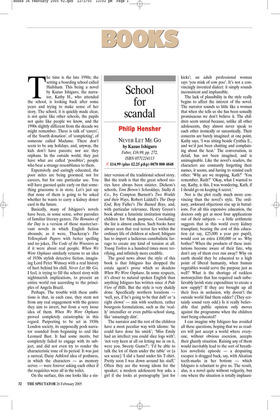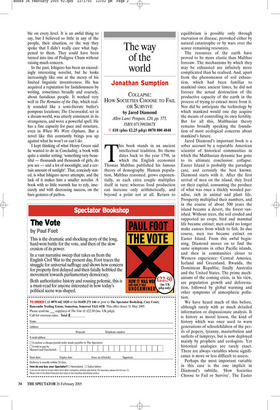School for scandal
Philip Hensher
NEVER LET ME GO by Kazuo Ishiguro Faber, £16.99, pp. 272, ISBN 0571224113 ✆ £14.99 (plus £2.25 p&p) 0870 800 4848 The time is the late 1990s; the setting a boarding school called Hailsham. This being a novel by Kazuo Ishiguro, the narrator, Kathy H., who attended the school, is looking back after some years and trying to make sense of her story. The school, it is quickly made clear, is not quite like other schools, the pupils not quite like people we know, and the 1990s slightly different from the decade we might remember. There is talk of ‘carers’, of the ‘fourth donation’, of ‘completing’, of someone called Madame. There don’t seem to be any holidays, and, anyway, the kids don’t have parents; nor are they orphans. In the outside world, they just have what are called ‘possibles’; people who bear a strange resemblance to them.
Expensively and caringly educated, the poor mites are being groomed, not for careers, but for one particular use. You will have guessed quite early on that something gruesome is in store. Let’s just say that none of them is going to be asked whether he wants to carry a kidney donor card in the future.
Basically, many of Ishiguro’s novels have been, in some sense, sober parodies of familiar literary genres. The Remains of the Day is a version of those master/servant novels in which English fiction abounds; as it were, Thackeray’s The Yellowplush Papers with better spelling and no jokes, The Code of the Woosters as if it were about real people. When We Were Orphans similarly returns to an idea of 1930s stylish detective fiction, imagining Lord Peter Wimsey with a real history of hurt behind his chill. Never Let Me Go, I feel, is trying to fill the school story with nightmarish implications, to present an entire world run according to the principles of Angela Brazil.
Perhaps. The trouble with these ambitions is that, in each case, they stem not from any real engagement with the genres they aim to invert, but from a very loose idea of them. When We Were Orphans proved completely catastrophic in this regard. Purporting to be set in 1930s London society, its supposedly posh narrator sounded from beginning to end like Leonard Bast. It had some merits, but completely failed to engage with its subject, and did not even try to render the characteristic tone of its period. It was just a surreal, Daisy Ashford idea of poshness, in which the characters — as memory serves — were forever asking each other if the requisites were all in the toilet.
On the surface, this one looks like a sin ister version of the traditional school story. But the truth is that the great school stories have always been sinister. Dickens’s schools, Tom Brown’s Schooldays, Stalky & Co., Ivy Compton Burnett’s Two Worlds and their Ways, Robert Liddell’s The Deep End, Roy Fuller’s The Ruined Boys, and, with particular relevance, Henry Green’s book about a futuristic institution training children for bleak purposes, Concluding; the list is almost endless. Such books have always seen that real terror lies within the ordinary life of children at school; Ishiguro has to import a ludicrous cannibalistic farrago to create any kind of tension at all. Young Torless is a hundred times more terrifying, and infinitely more credible.
The good news about the style of this book is that Ishiguro has dropped the estate agent’s prose which so deadens When We Were Orphans. In some respects, it’s closer to natural spoken English than anything Ishiguro has written since A Pale View of Hills. But the style is very shakily done. Specifically northern locutions — ‘well, yes, if he’s going to be that daft’ or ‘a right clown’ — mix with southern, rather bourgeois formulations, such as the ‘really’ intensifier or even public-school slang, like ‘amazingly dim’.
The narrator and the rest of the children have a most peculiar way with idioms: ‘he could have done his smirk’; ‘Miss Emily had an intellect you could slice logs with’; ‘not very keen at all on letting me in on it, were you, Sweety Gums?’; ‘I’d be able to talk the lot of them under the table’ or (a sex scene) ‘I slid a hand under his T-shirt. Pretty soon I was down around his stuff.’ Often they are the wrong idiom for the speaker; a modern adolescent boy asks a girl if she looks at pornography ‘just for kicks’; an adult professional woman says ‘you stink of cow poo’. It’s not a convincingly invented dialect: it simply sounds inconsistent and implausible.
The lack of plausibility in the style really begins to affect the interest of the novel. The narrator sounds so little like a woman that when she tells us she has been sexually promiscuous we don’t believe it. The children seem unreal because, unlike all other adolescents, they almost never speak to each other ironically or sarcastically. Their concerns are barely imagined: at one point, Kathy says, ‘I was sitting beside Cynthia E., and we’d just been chatting and complaining about the heat.’ The conversation, in detail, has not been imagined, and is unimaginable. Like the novel’s readers, the characters are constantly forgetting their names, it seems, and having to remind each other: ‘Why are we stopping, Kath?’ ‘You remember, Ruth?’ ‘Okay, what I wanted to say, Kathy, is this. I was wondering, Kath, if I should go on keeping it secret.’ Nor is the plot really much more convincing than the novel’s style. The ordinary, awkward objections rise up in battalions. For all this expensive education, the doctors only get at most four applications out of their subjects — a little arithmetic suggests that in this world every kidney transplant, bearing the cost of this education (at say, £25,000 a year per pupil), would cost an extra £100,000 or so. Why bother? When the products of these institutions become aware of their fate, why don’t any of them ever run away? Why on earth should they be educated to a high point of liberal humanity, when human vegetables would serve the purpose just as well? What is the shortage of reckless motorcyclists that has required such unbelievably lavish state expenditure to create a new supply? If they are brought up all their lives in seclusion, why doesn’t the outside world find them odder? (They certainly sound very odd.) Is it really believable that public opinion only moves against the programme when the children start being educated?
I can imagine why Ishiguro has avoided all these questions, hoping that we as readers will just accept a world where everyone, without obvious coercion, accepts their ghastly situation. Raising any of them would inevitably lead to the sort of breathless novelistic episode — a despairing escapee is dragged back, say, with Alsatian teeth-marks in her bottom — which Ishiguro is reluctant to give us. The result, alas, is a novel quite without vulgarity, but one where the situation is totally implausi ble on every level. It is an awful thing to say, but I believed so little in any of the people, their situation, or the way they spoke that I didn’t really care what happened to them. They could have been turned into tins of Pedigree Chum without raising much concern.
In the past, Ishiguro has been an exceedingly interesting novelist, but he looks increasingly like one at the mercy of his limited linguistic inventiveness. He has acquired a reputation for fastidiousness by writing, sometimes broadly and coarsely, about fastidious people. It worked very well in The Remains of the Day, which really sounded like a semi-literate butler’s pompous locutions; The Unconsoled, set in a dream-world, was utterly consistent in its strangeness, and wove a powerful spell. He has a fine capacity for pace and structure, even in When We Were Orphans. But a novel like this constantly brings you up against what he won’t or can’t do.
I kept thinking of what Henry Green said he wanted to do in Concluding, a book with quite a similar setting: ‘something very beautiful — thousands and thousands of girls, do you see — and a lot of moonlight, and a certain amount of sunlight’. That, concisely stated, is what Ishiguro never attempts, and the lack of it makes him a smaller novelist. A book with so little warmth has to rely, insecurely and with decreasing success, on the bare gestures of pathos.

















































 Previous page
Previous page